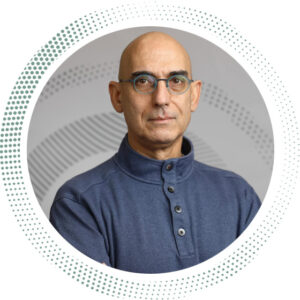Hope in Sight
Graduate students practice optometry tests in the School of Optometry and Vision Science.
The School of Optometry and Vision Science
Hope in Sight
Within days of October 7th, the School of Optometry and Vision Science was granting survivors and evacuees something they had lost in the slaughter: their ability to see. Thanks to the school’s one-of-a-kind mobile clinic, Bar-Ilan was able to replace hundreds of lost or broken glasses and place the focus on Israel’s resilient civic society.
Moving Target
When survivors emerged from their safe rooms after Hamas’ massacre on October 7th, most left a scene of utter devastation, some with nothing more than the clothes on their backs. For many, that meant staring down a new reality without the glasses they need to see. Fortunately, Bar-Ilan’s School of Optometry and Vision Science was able to come to their aid—literally.
“Our first stop was the Dead Sea, to treat patients from Kibbutz Be’eri,” explained Dr. Gad Serero, director of the school’s optometry clinics, including its one-stop-shop Mobile Vision Clinic for free vision testing, lens crafting, and, in the weeks following October 7th, free eyeglass frames, too. “Some of the patients had broken their glasses fighting terrorists, while others lost their glasses when their homes and possessions were destroyed. We were grateful to be able to fill this critical void for those in need.”

Prof. Yossi Mandel, head of the School of Optometry and Vision Science.
“The school is the only one in an Israeli university to offer a scientific degree in optometry, including research and development devoted to the visual system.”
—Prof. Yossi Mandel
Directed by Dr. Ziv Siman Tov, The Mina and Everard Goodman Faculty of Life Sciences School of Optometry and Vision science—the brainchild of Prof. Uri Polat, former director of the school—offers free, high-quality vision tests to people who lack access to eye doctors and optometrists, are unable to travel, or neglect eye health on account of mental illness or financial distress. Thanks to its advanced equipment, the clinic can go beyond the mere measurement of vision to detect eye diseases such as cataracts and retinal degeneration. And because it can be staffed by all School of Optometry and Vision Science staff and students, it was able to scale its operations dramatically in response to sudden need.
Since its initial visit to evacuees at the Dead Sea, the mobile clinic has made its way to cities and towns across the country, traveling from Metula to Eilat to translate academic and clinical expertise into solutions for the community. While in Eilat, the clinic was delighted to meet up with a School of Optometry student who had been evacuated from her home with her family. “She was so happy to be able to join us in our work,” recalls Dr. Serero. “She was a victim, but then she was able to help others in her situation, and she showed us all what resilience looks like. And it was a wonderful thing to see.”
Eye Chart
The Mobile Vision Clinic’s impact in numbers since October 7th:
vision tests performed
pairs of glasses made
cities and towns visited